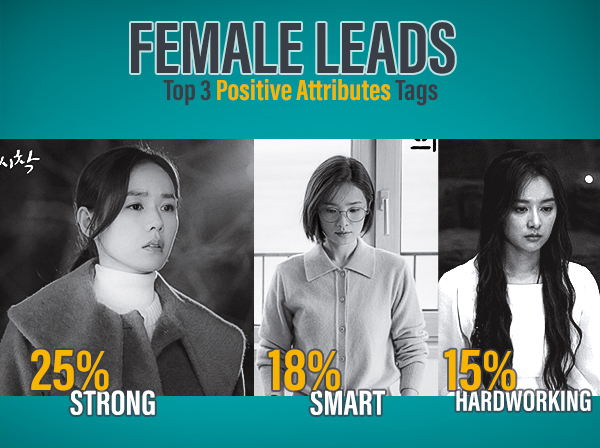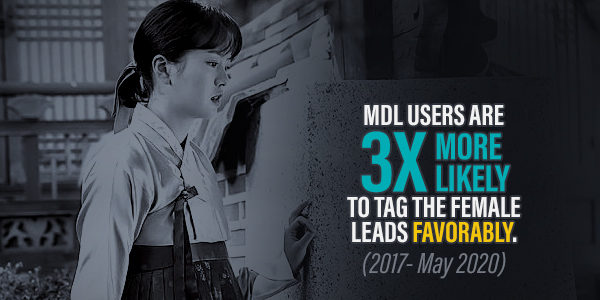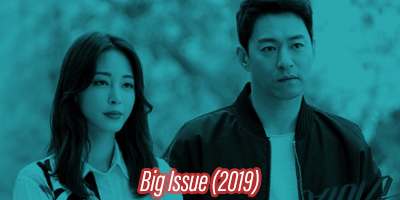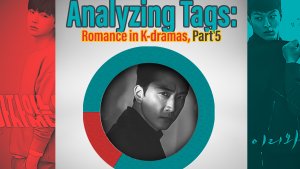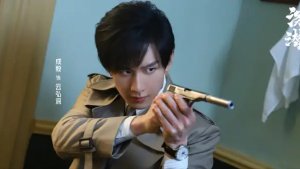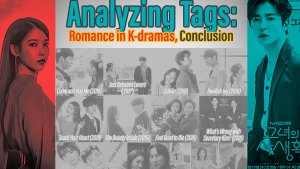 A Tag Analysis: Romance in K-Dramas - Conclusion
A Tag Analysis: Romance in K-Dramas - Conclusion
Hello, dear readers!
As promised, I'm trying to make time to complete this series, but bare with me as I do not have as much time nowadays to dedicate to this hobby - much as I'd like to. Nonetheless, I'll do my best to finish this up in a timely manner.
That said, let's go over the newest table of content for what has now become a massive analysis:
Analyzing Tags: Romance in K-dramas | |
| PART ONE | An overview of the Romance genre that focuses on the formulas used in K-dramas and how we can interpret them within the genre. Specifically, we go over the following tags: "Love Triangle", "Lead Chasing" and "Age Gap". |
| PART TWO | Continues the overview of the formulas used in K-dramas by analyzing the following tags: "Office Romance", "Boss/Employee Relationship," "Cohabitation" and "Childhood Connection". |
| PART THREE | Focuses on the tags related to the characters; specifically how we tag a female lead vs a male lead when it comes to Romance. Here we will cover the "friendship" tag which includes: "Bromance" & "Sismance" as well as go through the Money-Related (Poor & Rich Leads) and Financial Discrepancy (Poor Lead/Rich Lead) tags. |
| PART FOUR (current article) | This article serves as an overview of both negative and positive attribute tags (strong, weak, smart, etc.) that refer/apply to Female Leads. The purpose is to give an insight into how the audience perceives Female Leads when it comes to romance. |
| PART FIVE | This article serves as an overview of both negative and positive attribute tags (strong, weak, smart, etc.) that refer/apply to Male Leads. The purpose is to give an insight into how the audience perceives Male Leads when it comes to romance. |
| PART SIX | This article will wrap things up by analyzing the data regarding Male and Female Leads in order to compare what users and drama-creators focus on when considering the genders and why being aware of this may be important. |
You may have noticed that, once again, I had to split the Female Leads vs Male Lead portion of the article into three articles! I know, crazy, right?
But With a ton of interesting data to cover, this would've turned into a lengthy essay had I not opted to split the content in an effort to keep this as bite-sized as possible for those who prefer a quick read.
So as shown in the table above, we'll delve into the data of how we tag Female Leads in this article. Then, we'll cover the data regarding our Male Leads in the next. Last but not least, we'll dive into a comparison (heavily influenced by my own viewing experience and interpretation of the data) of how we tag Male vs Female Leads and what this means.
Now, following the structure of the previous articles, I'm again focusing only on the Romance Genre within K-Dramas. In addition, for the sake of accuracy (and working with the biggest percentages), I reduced the sample of dramas even more.
As I mentioned before, the tag system was implemented in October of 2017 so checking shows from that year forth gave me the best chance to find and cover dramas with enough tags. In addition, I further reduced my original sample by filtering out web-dramas (many of which had no tags).
So the tallied numbers that make up the backbone of this article correspond to Romance K-Dramas added to the MDL databased which finished airing between January of 2017 and May of 2020: |
YEAR | 2017 | 2018 | 2019 | MAY 2020 | TOTAL SAMPLE |
# of Dramas added to MDL | 120 | 154 | 148 | 18 | 465 Dramas |
(-) Web Dramas | I had each of the individual numbers of web-dramas set up by year, but I clicked on "home" while I was editing and lost the data :(. Since I still remembered the total, I just rolled with it rather than waste time re-doing this portion. Apologies for that. | - 183 Dramas | |||
# Total Dramas in our Sample | 282Total Dramas | ||||
Now, just like with the previous article, I think it's important to point out that this analysis isn't absolute and infallible. There is, after all, a margin of error which involves the following points:
- First, I still didn't check to see if all the dramas included had tags when I tallied the numbers. So you'll need to still take the numbers with a grain of salt, as the percentages should probably be higher than what I'm showing.
- I tried my best to filter out web series and only included those with enough episodes (more than 8, 1-hour episodes) which also had relevant tags.
- Keep in mind that, since we're dealing with the human element and everyone perceives things differently, not all tags may be accurate. But, with no way to check their accuracy, the numbers wouldn't account for that "user discrepancy/error".
By the way, you'll note that some of the graphics and examples include recent dramas that are not part of my sample. These have not been taken into account when it comes to the numbers, but I'll be using them simply to illustrate some of my points since I have them more fresh in my mind.
With that said, let's jump into it, shall we?

Let's start by going over some general numbers regarding our tags. Keep in mind that with so many new tags popping out almost daily, I only included those that had enough numbers to make it worthwhile to actually delve into (though no doubt there were others with enough numbers I didn't think to check).
If you think there's a tag that I missed and which you know has high usage, let me know in the comments down below, and I'll try to incorporate it into the final article.
FEMALE LEADSOFTEN A DAMSEL OR A BOSS? | |||
A total of 641 tags were tallied involving a description of the Female Lead. From those, the breakdown is as follows: | |||
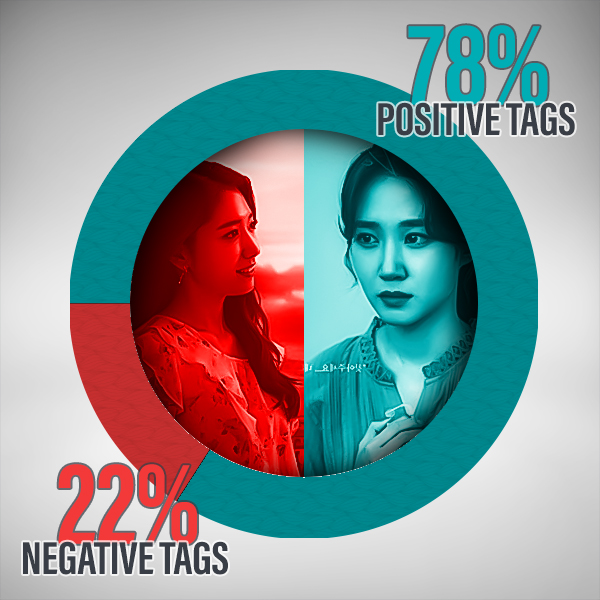 | |||
 Born Again (2020) |  The World of the Married (2020) | ||
Negative Tags Tallied:
| Positive Tags tallied:
| ||
I would like to take a moment to encourage users to check if there's an already existing tag that conveys what you're looking for (or something sufficiently similar) rather than creating a new tag.
Just to throw some examples out there of what I mean, we have "Naive female lead" (which came about first) vs "Innocent Female Lead". To make it even more apparent how redundant this is, Innocent Female Lead has been defined as: "a pure, guileless, or naive woman." And even if you were to look up synonyms for naive, you'll see innocent among the options.
Another example is "Cold Female Lead" vs "Cold Female" vs "Cold Woman". I can only see value in the first one, and the other two become quite redundant, more so when we have dramas tagged with all three, creating what can only be described as "tag-clutter"! Then we have "Smart Female Lead" (which came about first) vs "Intelligent Female Lead" which basically mean the same.
We also have "Cheerful Female Lead" vs "Cheerful Woman" vs "Cheerful Girl" vs "Cheerful Personality" vs "Cheerful Character". Not only are these all redundant, but I only find real value in the first one and its "Cheerful Male Lead" counterpart (though the most widely used is actually "Cheerful Girl"). And it's the same deal with "Strong Female Lead" vs "Strong Girl" vs "Strong Woman"...
We also have examples of different tags that cover the same general concepts. "Trauma" (which came about first) vs "Past Trauma" vs "Traumatic Past" vs "Painful Past" "Childhood Trauma" vs "Emotionally Wounded" for example. Trauma is a good umbrella term to encompass everything without going too specific and, therefore, becoming a spoiler of the Drama's plot.
Then we have the tags which unnecessarily act like "genres" such as: "Suspense" vs "Suspenseful", "Criminal," "Drama", etc.
And since my picky side has been awakened, I'd really encourage everyone to question whether the tag you're creating and/or using truly brings something of value to the table. The tag "Misunderstanding" is one that baffles me! Every show will have misunderstandings as that's a key component of drama! "Flashback to Past" is another one I have to question. Then we have "Lying", "Deception", "Trap", etc.
Don't get me wrong, tagging is great!
But tagging for the sake of tagging should not be the goal.
I hope you take this as food for thought rather than preaching. However, I'd be lying if I said that I've since stopped looking at the tags altogether because there are now so many!
But let's get back on track and dive into the numbers regarding the positive tags.
Although I admit we're still far from establishing the average Female Lead as capable as your average Male Lead, the data suggests we're on the right track. Now, I was disappointed by the fact that "Successful Female Lead" is actually one of the least used tags. In fact, only 9 Dramas within our sample were tagged as such.
Now, I said I was disappointed... but was I surprised?
Sadly, not at all. ╮("╯_╰)╭ 
I mentioned in the previous article that Female Leads tend to be introduced during moments of crisis, which could be financial, work, or social in nature. Of course, if our protagonist is truly unlucky, the writer may opt to have her go through all of them at the same time! Even if this doesn't happen during the first episode, more often than not we'll see the Female Lead fall on hard times during the first quarter of the drama.
Examples of these types of introductions can be found in: "Forest", "When the Weather is Fine", "When the Camellia Blooms", "Lawless Lawyer", "I'm Not a Robot," and (although not within our sample) "Into the Ring", and "Was It Love?", to name a few.
And even when Female Leads are introduced as being famous, we quickly see them fall out of social grace within the first few episodes of the drama. Recent examples of these scenarios can be found in: "Soul Mechanic", "Angel's Last Mission: Love", "Touch Your Heart", "Devilish Joy", and (although not within our sample) "It's Okay Not to Be Okay".
But perhaps the most prevalent scenario is to introduce a Female Lead who is not only going through a financial crisis but who's also neck-deep in emotional, spiritual, and/or mental turmoil. These Female Leads are shown to be so overwhelmed by their situation, that the Male Leads actually becomes their one and only refuge. As we've established before, cohabitation usually also plays a big role in these types of dramas, wherein the balance of power is tilted in favor of our Male Leads.
Dramas with such scenarios include: "Suspicious Partner", "Doctor John", "Black", "Let me Introduce Her", "Lovely Horribly", "Romance Is a Bonus Book", "Because This Is My First Life", "Thirty but Seventeen", and "Love in Sadness", to name a few. And, to further drive my point home, in seven out of these dramas, the Female Lead ends up moving into the Male Lead's residence.
And while I admit we've been getting some dramas with strong, well-written, and interesting female leads, we could definitely use more! While we're out it, it would be most welcome to get writers to portray our Female Leads as not only strong but successful as well! Some recent rare gems where you'll find successful Female Leads are: "Hyena", "Search WWW", "Hospital Playlist", "Alice", "Big Issue", "Her Private Life", "Itaewon Class", and "Crash Landing on You".
Now, don't get me wrong. It's great to see that a "Strong Female Lead" is the most used tag out of all the attributes, even if we're still getting slightly less than half the dramas tagged with it. The question is... what does this mean when it comes to un-tagged Female Leads?
Back when @Lua and I were gathering the data for the first two articles of this series, I talked to a few MDLs regarding what they thought of Female Leads in Romance K-dramas. Those conversations yielded the following theories:
- Female Leads not tagged as strong = Weak Female Leads.
- Female Leads not tagged as strong = Average Female Leads. Meaning, they are not particularly strong, but also not weak.
Personally, I subscribe to the second line of thought because I've seen dramas where the Female Leads show moments of strength, but not enough to earn her the "Strong Female Lead" tag. This could be either due to inconsistencies in the way she's written or the simple fact that her role in the story isn't as important (in that she plays more of a support role to the Male Lead).
At the same time, I've also seen Dramas tagged with a "Strong Female Lead" which I personally disagreed with, as the Female Lead wasn't really remarkable, such as those found in: "I'm Not a Robot", "The Crowned Clown", "Radio Romance", "When the Weather is Fine", "Tomorrow with You" "Love with Flaws", "My Absolute Boyfriend" and, more recently, "Meow, the Secret Boy", "The Game: Towards Zero", "Oh My Baby" and "The King: Eternal Monarch", to name a few.
For context, the tag "Strong Female Lead" has been defined as:
- 1) A physically strong female lead 2) A female lead who holds a lot of control in her life and/or in others. 3) A female lead that can protect her values through extreme hardships.
- A well-written female character at the forefront of a TV show or movie. ( <- new definition)
Still, the reason why I believe a Drama without a "Strong Female Lead" tag doesn't automatically mean she's weak has to do with the data regarding the negative traits. So let's take a look at those findings next:
NEGATIVE TRAITS TAGS[ 144 ] | |||
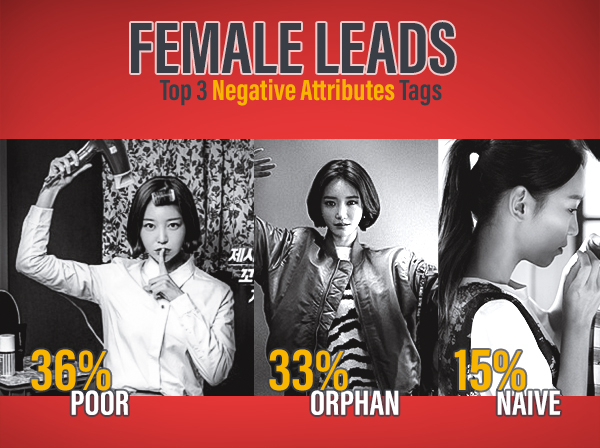 | |||
18% of our sampled Dramashad the "Poor Female Lead" tag and 12% had the "Orphan Female Lead" tag. | If we compare only the tags, we find that Strong Female Lead has a 20% usagevs Poor Female Lead which has an 8% usage. | ||
 |  | ||
Into the Ring (2020)[ Poor + Smart + Aggressive + Strong FL] | Love in Sadness (2019)[ Poor + Nice + Strong FL ] | ||
Goo Se Ra manages to succeed at her enterprises via her wit and capacity to overcome obstacles. Though the ML assists her, she's the captain of her own destiny. | Ma Ri is trapped in an abusive marriage. In an effort to escape, she undergoes surgery to change her face. Her fate, however, lies on the ML's hand. | ||
Overall... | |||
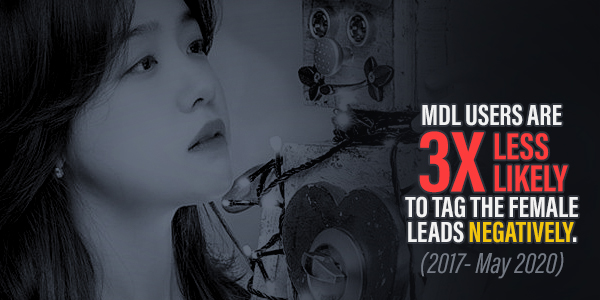 | 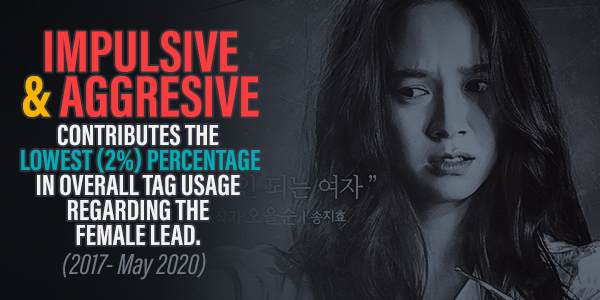 | ||
 |  | 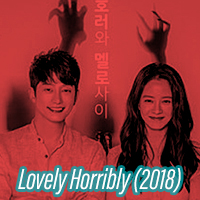 | |
However, only 1/30 dramas will feature a "Successful Female Lead",
if numbers are to be believed!
This confirms that MDL users tend to focus more on our heroine's positive attributes than on the negative ones, at least when it comes to tagging a drama.
It's safe to assume that overall: |
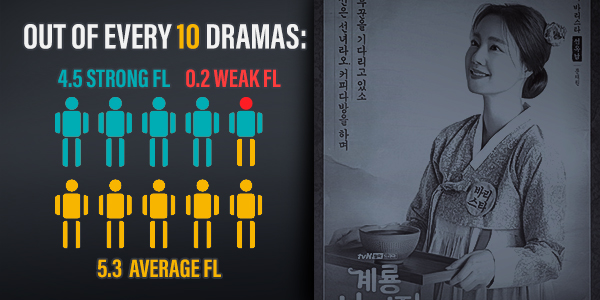 |
Therefore, an average Female Lead is the most recurrent type of protagonist in Romance K-Dramas. |
The difference in numbers shows that... | |
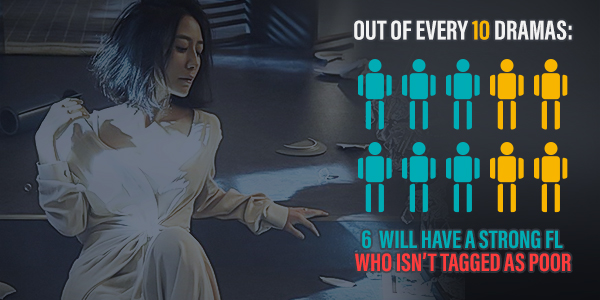 |  |
With that said, we've officially finished going over the data regarding our Female Protagonists! The next article will feature the data regarding our Male Leads, so keep an eye out for that! If you've made it this far, I thank you for sticking with this, and I hope you'll consider sharing your thoughts in the comments down below!
Here are some questions to get a conversation started:
- Did you enjoy the article? Was it easy to digest?
- Did you also read the previous article? If so, have you tagged any dramas since?
- Was there a subject covered in this article that interested you?
- Do you agree or disagree with my findings and interpretations?
- Do you agree with all the Dramas tagged with a "Strong Female Lead"?
- What are your criteria when it comes to deciding whether a Female Lead is strong or weak?
- Which tag relating to the Female Lead is the one you like the most and why?
- Which tag would you like to see more used?
- From the dramas you've finished, which one do you consider has the strongest Female Lead?
- And which one has the weakest Female Lead?
- Which positive and negative tags have you used the most?
- Are there any tags regarding the Female Lead that will cause you to not watch a drama?
- What is your opinion on the current use of tags?
- Do you check tags at all?
- Do you find the sheer number overwhelming of would you rather see them used more?
- Would you rather see more general umbrella-type of tags or do you like how specific the tags have become?

